‘When God’s Call Is Bigger Than a Building’
Invitation to a Changed Life
As the visioning of the congregation continued, [Arlington Presbyterian Church] members connected the crisis of their own congregational life to the life of the surrounding community. In 2012, APC realized they needed to set their priorities within their call from God to the neighborhood.
We really needed to stop asking ourselves questions and start knocking on our neighbors’ doors in a sincere, committed, and organized effort.
It wasn’t enough to do the intellectual discernment processes or for the congregation to assume they knew the needs of the neighborhood.
We were challenged to pay attention not to what we thought needed to happen, what we imagined the community needed, but to listen to what our neighbors had to say — to get to know and be in relationship with our neighbors and hear them.
Congregants rode buses up and down Columbia Pike [in Arlington, Virginia]. They talked with local business owners, teachers, domestic workers, any and all who make up the infrastructure of Arlington County. On Saturday mornings, church members set up tables in the church’s parking lot, located right next to a bus stop. They used the community-organizing strategies of listening sessions and one-on-one meetings to listen to the deep wisdom of the neighborhood.
One day in one of the villages there was a man covered with leprosy. When he saw Jesus, he fell down before him in prayer and said, “If you want to, you can cleanse me.” Jesus put out his hand, touched him, and said, “I want to. Be clean.” Then and there his skin was smooth, the leprosy gone. (Luke 5:12-13)
APC listened. They heard of people covered in debt and exorbitant rent. They heard of people longing to be healed from weary commutes, financial uncertainty, and living away from family and kinship. They listened as neighbors shared hopes, dreams, and ideas for their future, a future they wanted to be in Arlington County.
This relational work allowed a guiding question to emerge for APC: What is breaking our hearts in our neighborhood?
The stories of the neighbors broke the heart of APC, binding the well-being of APC up in the well-being of the neighborhood. Jesus pulled the congregation into the neighborhood streets, and they practically tripped over the need for affordable housing as they listened to story after story.
The stories signified the emerging incompatibility with the old and the new: as we began to think about jettisoning our 1950s building, we also started to rid ourselves of the 1950s version of Christianity that had captured our thinking. Our ministry shifted from “if we build it, they will come” to “we will go to the neighbors and build.”
It wasn’t about what we could do for our neighbors; it became about how we heard God’s invitation in their stories. How their stories became our stories together. …
For More of the Story, Go Around the Corner
There is a plaque on the outside of Gilliam Place [apartment building], created by an unknown entity, that says “Here stood the Arlington Presbyterian Church.” The plaque names how APC played a significant role in the life of the South Arlington community. The end of the plaque reads, “The Church property was sold in 2016, and the buildings were demolished in 2017.”
The end. It reads like a church obituary.
Not to be outdone by a building plaque, several APC folks want to put up a sign at the bottom of the plaque that reads, “for more of the story, go around the corner …”
Creating new wine for a new wineskin hasn’t been easy, and God isn’t finished with us. Right now, APC stands in the tension between our previous stories and the ones we hope will guide us forward. As we claim these new stories, we see ourselves sharing life and evolving with those in Gilliam Place.
I now realize how our new space has allowed us to begin living a new future together with our neighbors that would have been inconceivable in the old building.
We are still dynamically breaking open those old models of church. We stand in the community, asking questions about new ways and new directions.
We commissioned a new hymn to honor this new era of APC at Gilliam Place. We sing these words often in worship:
We have been called to listen and called to act, we have been called to tear down and called to build, and we’re still people on a journey, our work isn’t done. Keep us faithful in the way of love.
This hymn is a reminder that God is not done with APC even after this miraculous story. We’re still people on a journey, drinking new wine in a new wineskin. For all of this — for the old wine and old wineskin, for the new wine and new wineskin — we give God never-ending thanks.
Excerpted from “Gone for Good? Negotiating the Coming Wave of Church Property Transition,” edited by Mark Elsdon © 2024 (Wm. B. Eerdmans Publishing Co.). Reprinted by permission of the publisher.
The formerly enslaved artisans who constructed First African Baptist Church in Beaufort, South Carolina, sometime after the Civil War didn’t use nails. Metal was expensive and often hard to come by for Black builders less than a generation from bondage.
The Rev. Alexander McBride, First African’s senior pastor, explained how the laborers built the church in Gothic Revival style, noted for its signature pointed arches and windows. The current building replaced an antebellum praise house, an open one-room clapboard space with little furniture so the enslaved could engage in a more mobile, joyful service removed from white surveillance and sit-quiet worship styles.
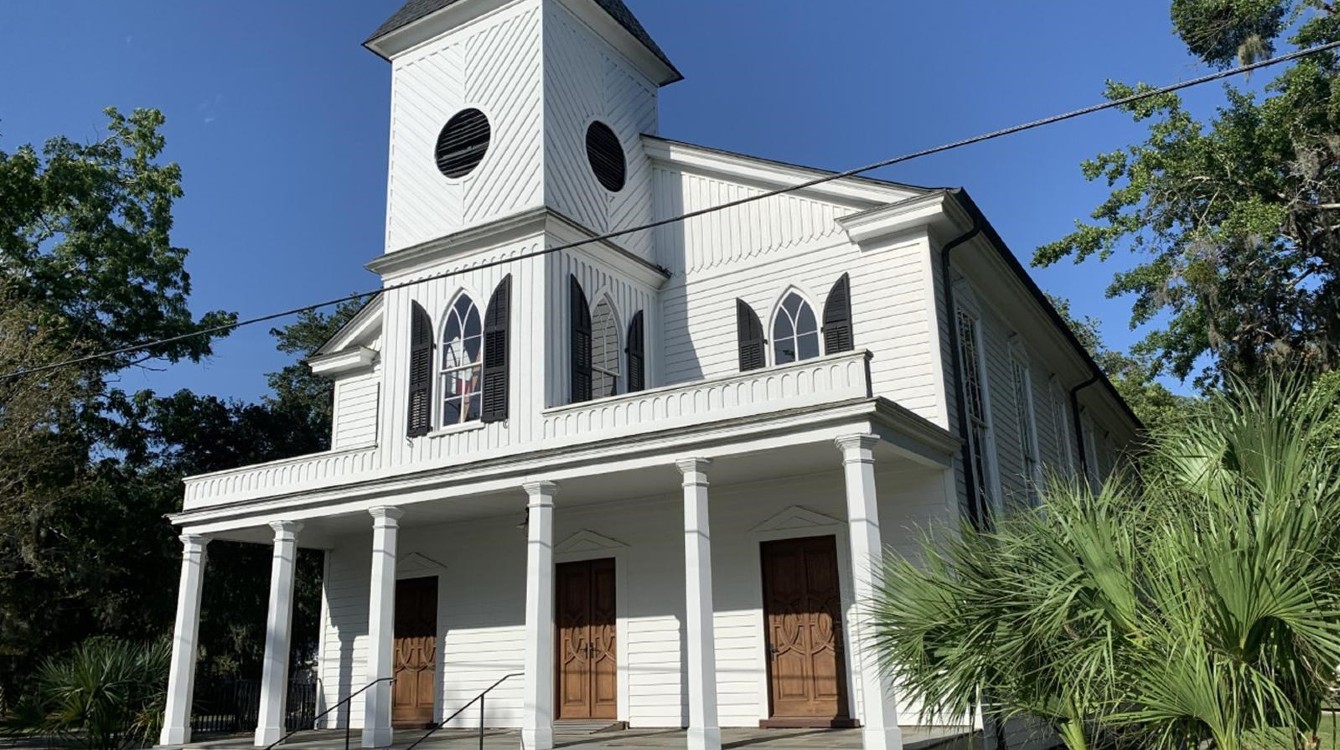
“They used the mortise-and-tenon method, where they interlock the wood. And this church has withstood every hurricane” that has rolled through the coastal city, said McBride, the 16th pastor at First African in its more than 150 years of existence.
And there have been many storms. An 1893 hurricane drowned many of the town’s Black residents, stranded in low-lying areas or swept to their deaths. But even that massive storm didn’t cause significant damage to the church, thanks to the unnamed craftsmen who may have lacked nails but had possessed the skill and wisdom to use the strongest joint known to woodworkers.
The church’s biggest current enemies are time, termites (which have eaten their way through some of the structure’s undercarriage) and moisture — largely unavoidable menaces for a century-old building in a humid seaside town.
Earlier this year, First African was among dozens of historically Black churches to win grants from the National Trust for Historic Preservation’s African American Cultural Heritage Action Fund. Those monies, through the Preserving Black Churches initiative — $4 million in this funding cycle — will support projects that recast their sites’ history through new interpretation or exhibits, grow capacity through staff hires and community outreach, and repair aging or damaged buildings.
Diversity of spaces
The grantees highlight the diversity of Black worship spaces and the history of how Black Americans have fought for religious freedom and built their own institutions amid racism and violence. They include institutions such as 16th Street Baptist Church in Birmingham, which just marked 60 years since the Ku Klux Klan bombing that killed four girls and damaged the church; the elegant Black-majority Basilica of St. Mary of the Immaculate Conception in Norfolk, Virginia; one-room churches built by hand and heart; and churches in places with historically small Black populations, such as Alaska and West Virginia.
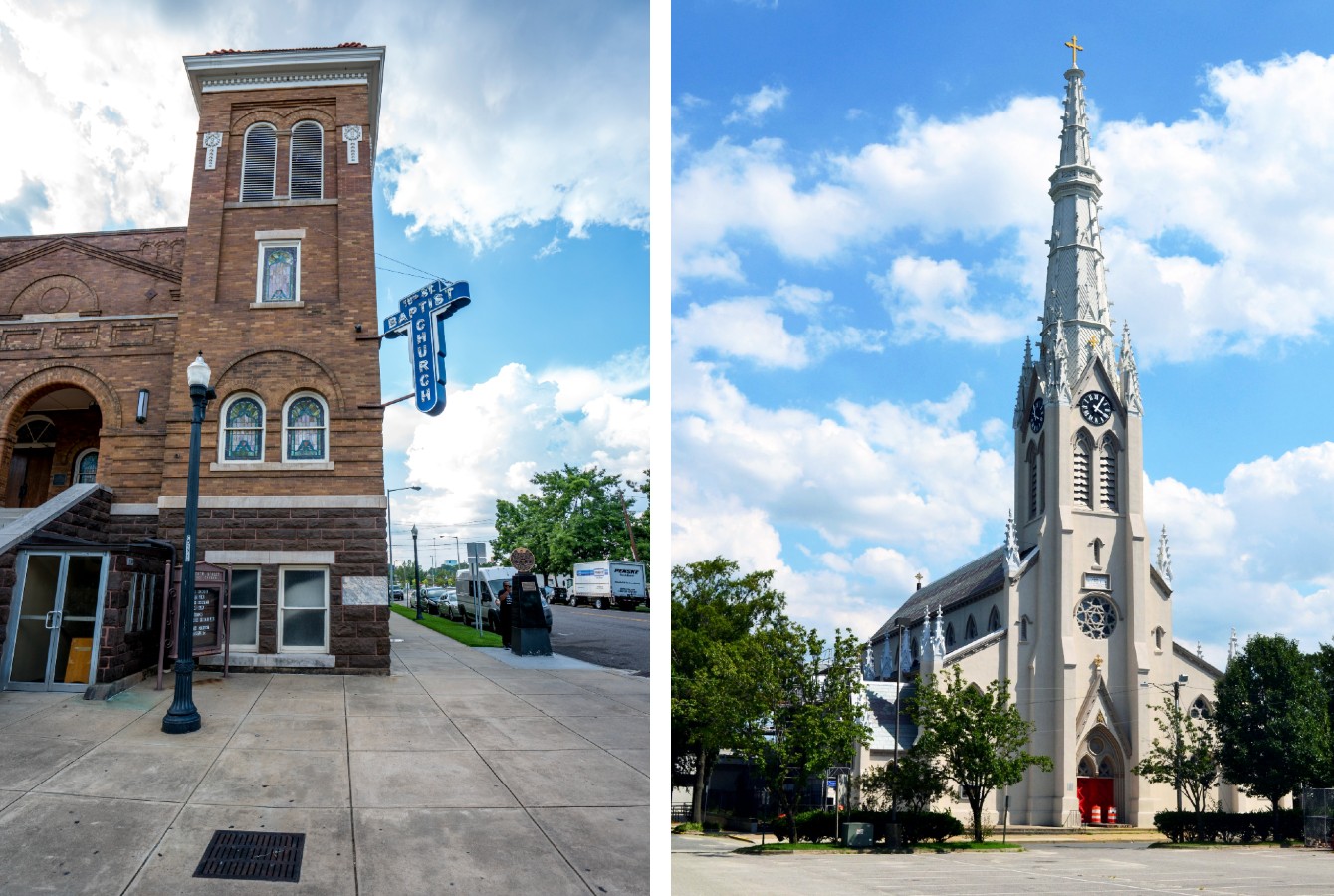
“Black churches are living testaments to the achievements and resiliency of generations in the face of a racialized, inequitable society,” said Tiffany Tolbert, the Action Fund’s senior director for preservation. “They’re foundational to our Black religious, political, economic and social life.”
In some places, a church is the only building that remains as an artifact of a Black community that no longer exists. Scotland AME Zion Church in Potomac, Maryland, not far from the nation’s capital, is one such example from a community swallowed by encroaching development and urban sprawl.
Religion scholar C. Eric Lincoln once described the Black church as the unchallenged “cultural womb of the Black community.” Fellowship halls and sanctuaries in Black churches have long functioned as multipurpose rooms, where worship and politics meet. Churches like Beaufort’s First African have been incubators for Black social enterprise; during Reconstruction, First African was the site of a school for freed people, hungry for the literacy denied them during slavery.
Numerous historically Black colleges, civil rights protests and social movements trace their origins to Black pulpits and pews. Preserving church spaces can thus have a multiplying effect, documenting as well the stories of Black communities at large and the work of Black architects, artisans and mutual aid.
Worthy of preservation
It’s commonly said that the church is “more than the building,” yet buildings are material remnants of history and culture. What kinds of meaning do church buildings have for you?

That’s the case with the Halltown Memorial Chapel, built in 1901 not far from Harpers Ferry, West Virginia, where abolitionist John Brown and his band of brigands in 1859 had raided an arsenal in hopes of ending slavery. The one-room chapel is small, only about 40 feet by 50 feet, with room for 13 pews. It was built of rubble stone by church members, stone masons and laborers who also constructed a nearby turnpike or worked at the local paper mill, which has since closed. Services continued there for decades, only ceasing after World War II because of a dwindling congregation. After that, it hosted the occasional gathering until its last event — a wedding of one of the founders’ descendants — in 1988.
Kim Lowry, the treasurer of the Halltown Chapel Memorial Association, cataloged the many repairs needed via email. “Water damage from a hole in the roof and from water seeping in under the foundation was the culprit. And without regular events or services, the chapel suffered from neglect. The plaster walls needed to be rehabilitated, the flooring had rotted and deteriorated and required replacement, and exterior work was required on the wood window sills and frames and the Chapel entrance area.”
Powderpost beetles had chomped on the pews, spreading ruin with every bite. One of the church’s three stained-glass windows was missing altogether, and the others needed restoration. One is a poignant tribute to Edna, a church member’s child who had died in infancy. Such design features — with references to congregation members who fundraised for such elements — are tangible history, traces of people long gone and their efforts to build beloved community.
“It’s impossible to talk about American craftsmanship without talking about the Black and Indigenous hands that constructed it even before 1776,” said Brandon Bibby, a senior preservation architect with the Action Fund. “It’s important to preserve that aspect so that we as a society don’t forget. By preserving, we are saying, ‘This place matters in the whole context of the American landscape.’”
“What I want most is that through this project, Black congregations and communities will see the value and beauty in their places and see they are worthy of preservation,” he said.
Does your church have a historic role in your community? How has its role changed over the years?

Recognizable elements of church design can be particularly vulnerable to deterioration. Steeples are both symbolic and pragmatic communicators; their towering presence in a landscape announces where people can worship or seek shelter. Yet sitting aloft, largely inaccessible, placing strain on dramatic, heaven-pointed roofs and often channeling rainwater to places it shouldn’t go, steeples can be a source of problems that go unnoticed until a leak sprouts or cracks appear.
Many of the Preserving Black Churches grant recipients need steeple repair. When congregations are forced to choose among costly repairs, a steeple can sometimes take a back seat to high-traffic areas with more visible problems, such as the sanctuary itself.
Funding a range of needs
What traditional elements of your church are difficult to maintain? Would your congregation be OK without them?
Declining church attendance has meant less coin in the collection plate and, in turn, fewer resources for maintenance and repairs. Black American church membership has dropped in recent years, from 78% in 1998-2000 to 59% in 2018-2020, though Black Americans remain one of the top populations most likely to be church members (along with conservatives and Republicans), according to a multiyear Gallup poll released in 2021.
A 2012 Kellogg Foundation report also found that Black people give more of their income to community-based causes than whites, in part because of a culture of mutual aid, lack of access to white-dominated institutional funding and traditions such as tithing. Even so, when an evangelical research firm surveyed church financial well-being, more Black pastors said their congregations had less than seven weeks of cash reserves — perhaps because they are dependent on a community with lower wealth in the first place. Getting money to repair churches can be particularly difficult.
Following the first grants that went to 35 churches across the country, recipients of another $4 million will be announced in January, Tolbert said, as part of a plan to distribute between $8 and $10 million, with support from Lilly Endowment Inc. In total, $20 million will be invested through Preserving Black Churches across all of its program goals.
If you were asked what in your church is worth preserving, what would you say? What would your congregation say?

That funding will go not only toward capital needs, Tolbert said, but also toward planning, to help churches understand how to undertake preservation. Matching grants will help churches create new preservation endowments so that invested income can be used to support maintenance and preservation of existing buildings. Emergency grants are also available to address immediate issues such as damage caused by floods, fires and even acts of vandalism.
And the Action Fund is working with six churches — four in Alabama and one each in California and Chicago — to help develop comprehensive stewardship plans that will address restoration and rehabilitation of the buildings along with programming and interpretation, activating space for community, and bringing in arts and social justice programs. They will benefit from a consulting team of architects, engineers, business planners and capital campaign fundraisers.
“It is essential that these places are activated,” Tolbert said. “They are centers of worship, but also, they continue to serve the community.”
Action Fund executive director Brent Leggs told The Washington Post in an interview that Black churches are exceptional lenses through which to view Black and American history. “It’s amazing to see centuries of Black history told at historic Black churches. Some of the stories include formerly enslaved Africans moving through emancipation, beginning to form communities, … and some of the earliest buildings founded by African Americans in the United States [include] a Black church. These places are of exceptional significance. Their stories matter, and they are worthy of being preserved.”
Would members of your community benefit from learning more about your congregation’s past and its role in local history?
Questions to consider
- It’s commonly said that the church is “more than the building,” yet buildings are material remnants of history and culture. What kinds of meaning do church buildings have for you?
- Does your church have a historic role in your community? How has its role changed over the years?
- Steeples are a traditional element of many churches, yet they can be difficult to maintain. What traditional elements of your church are difficult to maintain? Would your congregation be OK without them?
- If you were asked what in your church is worth preserving, what would you say? What would your congregation say?
- How is your space “activated” for your community? Would members of your community benefit from learning more about your congregation’s past and its role in local history?
During the COVID-19 closures of 2020 and 2021, the leaders of Dorcas Ministries decided to remodel their popular thrift shop to look and feel like a T.J. Maxx, the off-price retailer with discounted items from name-brand fashion to home decor.
The shop, located in a former grocery store in Cary, North Carolina, was already a treasure trove for bargain buyers. The new look made it even more enticing.
The Dorcas Thrift Shop space is mostly taken up with lightly used clothing, rack upon rack, neatly organized by type. At one end of the cavernous building are multiple shoe shelves arranged by size. Handbags, belts and scarves line a wall.

Closer to the checkout points are seasonal items — right now, Halloween costumes — and farther down, toward the rear of the store, shelves stocked high with housewares. In between, glass cases sparkle with vintage jewelry.
Customers flock to the shop from all over Wake County and the surrounding region. After browsing with shopping carts or tote bins, they pay in cash or with credit or debit cards.
The average cost of an item? $2.50.

There’s a reason the thrift shop, which anchors a plaza owned entirely by Dorcas, tries to model its services on professional business practices.
The ministry sees that as a way of treating people of all income levels fairly and eliminating barriers to social mobility.
“Our job is to treat everyone like God’s children, with the compassion, dignity and respect they deserve,” said André Anthony, the ministry’s CEO. “That’s our primary focus.”
Volunteers help neighbors thrive
That formula appeals not only to low-income shoppers but also to a healthy corps of middle-class volunteers from Cary and Morrisville, affluent suburbs of North Carolina’s capital of Raleigh, who have helped make the ministry a success.
The ministry takes pride in having earned Top 10 ratings in the “Best Thrift Shops” category on Yelp, the crowd-sourced review platform. On a typical weekday morning, several dozen people wait outside the shop ready to make their way in as soon as the doors open at 11 a.m.
Started 55 years ago by a group of women from nearby churches, the ministry takes its name from the seamstress Dorcas, mentioned in the book of Acts as “always doing good and helping the poor” (Acts 9:36 NIV).
Last year, the shop generated $3.2 million in sales. It used that income to provide $2.2 million in financial assistance to the area’s poor, becoming a premier social welfare agency for a region of more than 200,000 people.
Dorcas employs 27 full-time staff, but it relies on 600 dedicated volunteers, without whom it could not fulfill its mission of “helping neighbors thrive.” Its volunteers, many retired from careers as IT specialists, corporate executives and health care professionals, are eager to give back to their community.
What compelling vision does your organization use to inspire volunteers?
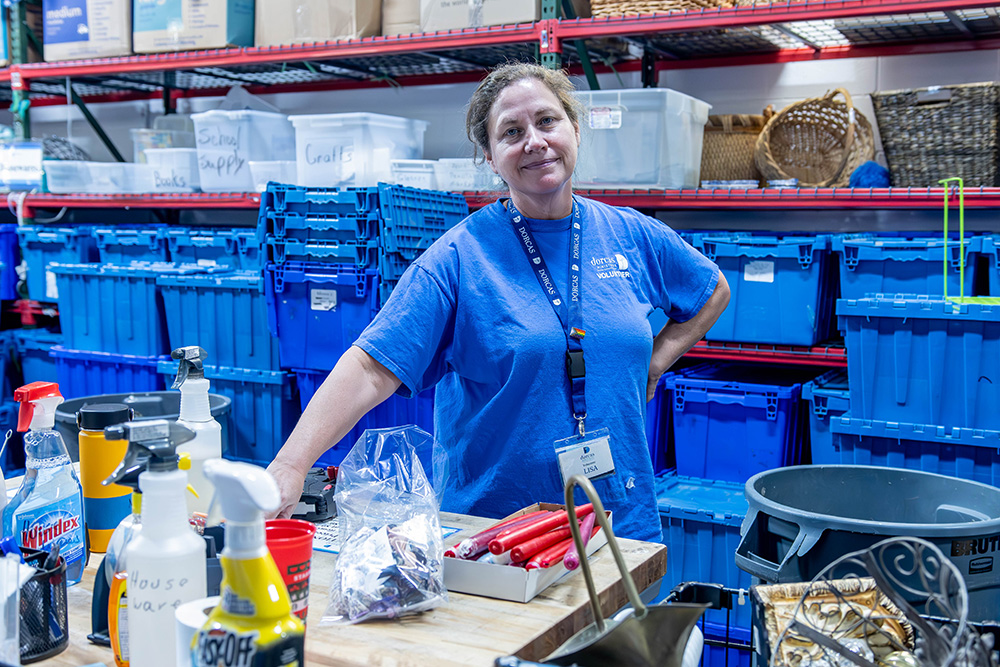
Some 500 of those volunteers take one or two weekly three-hour shifts sorting, cleaning, fixing, pricing and labeling the avalanche of donations that accumulates daily at the shop’s rear dock.
Impressive as it is, the thrift shop is just the foundation of a vast set of services that Dorcas offers with income from the store. That’s where about 100 additional volunteers with experience working with people in difficult life circumstances apply their talents.
In 2022, Dorcas helped 2,000 families (or about 5,800 individuals) with emergency financial aid and other services at its crisis center located in offices next to the thrift shop. Those helped are typically low-wage workers living paycheck to paycheck who, because of divorce, illness, the birth of a child and/or lack of paid parental leave, fall behind on their rent or are facing eviction.
“Dorcas is probably the most significant social ministry in our area in terms of how many people they serve and the kind of services they provide,” said the Rev. Wolfgang Herz-Lane, the senior pastor of Christ the King Lutheran Church in Cary, one of 40 area congregations that regularly donate financially to the ministry.
Christ the King provides Dorcas with a steady stream of volunteers and refers people in need. So much so, Herz-Lane said, that he thinks of it as a “social ministry arm of our congregation.”
Helping people in crisis
Like the thrift shop, the Dorcas crisis center is modeled on an ethic of respect and dignity for all. A receptionist greets people and directs them to private rooms where they meet with case workers to assess their needs and come up with plans to address their financial difficulties.
How do you communicate your vision and invite potential volunteers to be part of it?

Clients at the crisis center receive checks — usually within 48 hours — to help pay for rent or utilities. Dorcas may even help pay for veterinary care (addressing the No. 1 reason pets wind up in shelters — families’ inability to pay veterinary bills).
But the aid doesn’t stop there. Clients receive ongoing counseling and other services for a period of three months to a year. That may include one-on-one career coaching, cash stipends for those willing to enroll in workforce training classes at the local community college, or preschool scholarships for children.
“We don’t just hand them a check for rent assistance; we hand them a check and say, ‘OK, let’s talk through some changes that can be made,’” said Sally Goettel, a former Dorcas board member who continues to volunteer there. “By getting that holistic approach, it’s just so much more effective.”

At the crisis center, clients can also take advantage of a mobile University of North Carolina nursing clinic that provides free basic preventive care, including school physicals, every Tuesday morning and twice a month on Saturdays.
But the most basic form of support the ministry provides is food.
Food assistance for families in need
Similar to the T.J. Maxx-inspired thrift shop, the Dorcas food pantry, located a few doors away, is modeled on a high-end food store. Dorcas clients can take a cart and browse a wide selection of prepared foods as well as fresh fruits and vegetables, dairy items, baked goods, paper goods, diapers and even cat food. Grocery shelves are labeled in English and Spanish. Recently, the pantry started a Taco Tuesday meal kit. (About 8% of Cary residents are Hispanic.)
Here, too, the idea is to treat people with respect — not just to give them a handout. While anyone can shop at the Dorcas thrift shop, the pantry is reserved for families in need who have gone through its client services intake.
“It’s not a preselected bag of food,” Anthony said. “It’s very much client choice. It’s intentionally set up where, when you walk in, you feel just like anybody going to a grocery store.”
If you have an idea for Christian social entrepreneurship, could it be supported with an active volunteer base?
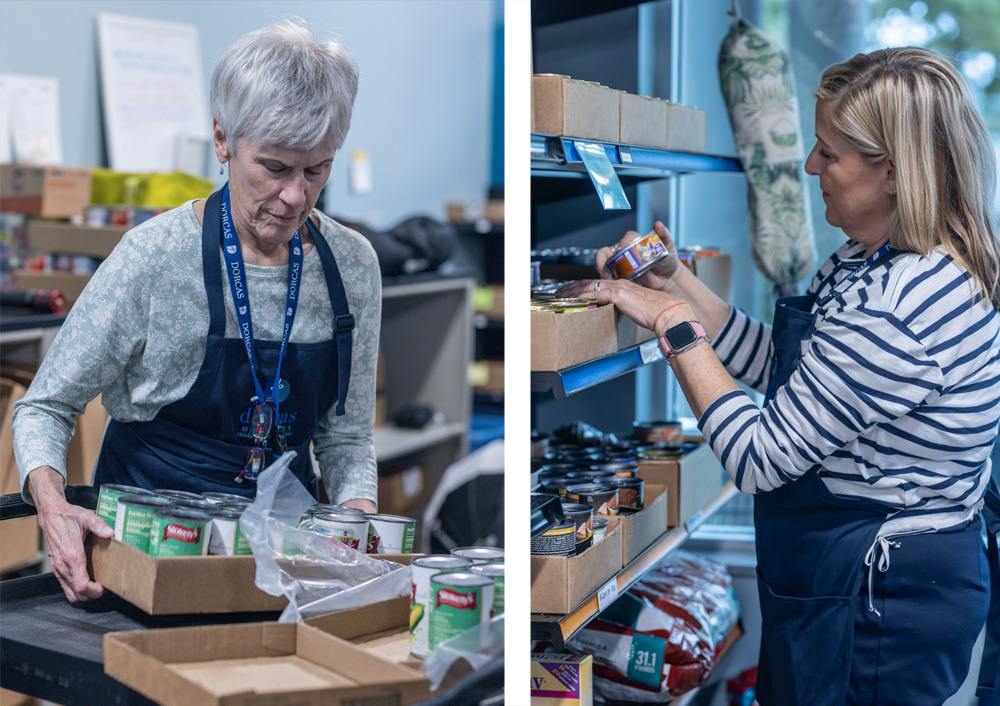
Sallie Whelan, a retired schoolteacher, said it’s the interaction with clients that makes the food pantry such a satisfying volunteer experience.
“I wanted to do something in my retirement that would go towards my philosophy of helping people,” said Whelan, 67. “We’re working directly with the people that are shopping — helping them find something that they’re looking for or explaining the process to them.”
Founded on faith and dignity
While the ministry is motivated by the Christian faith of its founders, the employees and volunteers do not ask clients about their faith and only mention its Christian roots if asked. Among the 40 congregations supporting Dorcas, one is a synagogue; another, a Hindu temple.
“Whether they’re Christian or whether they’re Hindu or whether they’re purple or whether they’re green, if you want assistance and you live within the geographic region that Dorcas supports, they can assist you along a path,” said Barbara Bostian, 66, who volunteers as a career coach and serves as vice chair of the ministry’s board of directors.
That desire to help neighbors is how Dorcas got its start. In 1968, a group of mostly white women from Cary’s downtown churches that had been meeting for a Bible study decided to add a service project.
Southern schools were still segregated in those days, and the women decided to form a class for Black children who didn’t have access to kindergarten.
They drove through town, stopping at homes where they spotted a clothesline with children’s clothes or toys on the front lawn. About 40 children eventually enrolled and met at a local predominantly Black church.
Thus was born Christian Community in Action, still Dorcas’ legal name.
How does your faith community offer support while maintaining the respect and dignity of its neighbors and clients?

Soon after the program began, people started donating clothes for the children, and a small clothing closet was set up. To help preserve people’s dignity, CCA began charging people a nickel or a dime for each item. This was the start of the Dorcas Thrift Shop.
“They started putting money in a jar,” said Jill Straight, Dorcas’ senior director of client services and advocacy. “And then when one of the families they were working with needed help with a light bill or water bill, they used the jar of money to help with the bill.”
By 1972, the thrift shop transitioned from a church closet to a downtown apartment. The kindergarten program ended in 1980, but the thrift shop continued to grow.
After moving half a dozen times, the ministry bought an old strip mall in 2008 and invested more than $4.5 million in building upgrades. It rented out adjacent spaces to other nonprofits, including a Habitat for Humanity ReStore, an after-school literacy program and a behavioral health care management group.
Dorcas Plaza also includes a few for-profit businesses — one of which, a pool hall, has been a good neighbor to the ministry, contributing money through fundraising drives.
These sound business decisions have helped the ministry boost its volunteer roster. Each week, a Dorcas staff member conducts an orientation tour for potential volunteers. On a recent Tuesday, those included a handful of retirees and a young man with developmental disabilities.
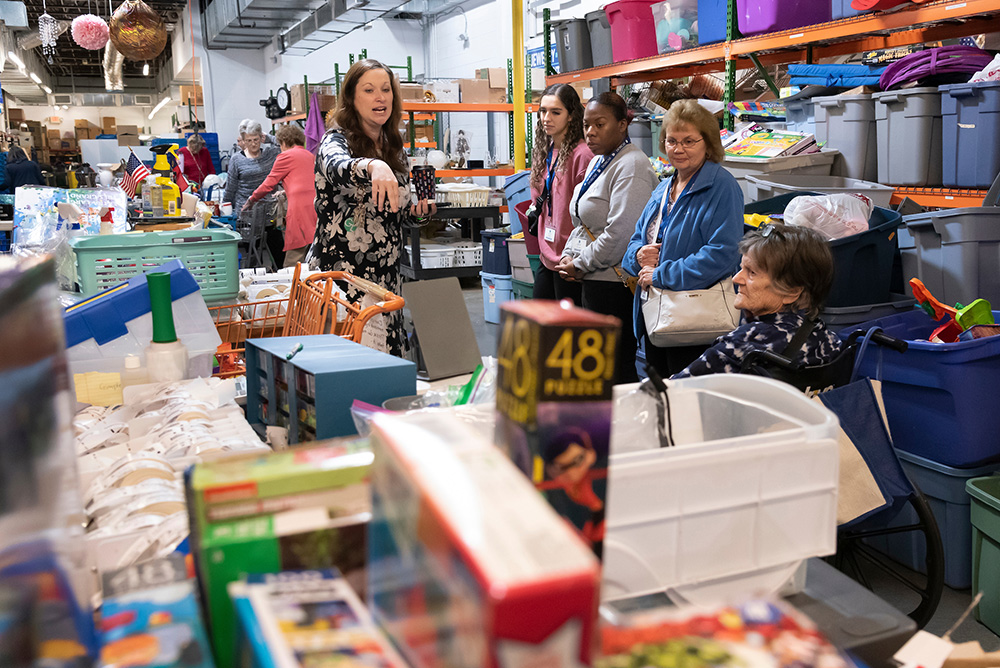
Shelley Hobbs, Dorcas’ director of marketing, gave the group a behind-the-scenes tour of the thrift shop, the food pantry and the crisis center.
All were familiar with the Dorcas Thrift Shop, and several said they had shopped there for years. One of them, Carolyn Jungclas, had recently retired from a career as head of procurement for First Citizens Bank.
Jungclas, 60, described herself as a crafter who loves to sew. She wanted to volunteer to sort through the linens and fabrics the thrift shop receives. A friend had told her that Dorcas could use her help.
“I’m a firm believer, from the Gospel of Luke, that to whom much is given, much is expected,” Jungclas said.
But what impressed her most was the ministry’s emphasis on treating people with dignity.
“To me, that just is so key,” Jungclas said. “I’m hoping to start as soon as possible.”
How do your volunteers describe the work of your organization? How do they describe working for your organization?
Questions to consider
- What compelling vision does your organization use to inspire volunteers?
- How do you communicate that vision and invite potential volunteers to be part of it?
- If you have an idea for Christian social entrepreneurship, could it be supported with an active volunteer base?
- How does your faith community offer support while maintaining the respect and dignity of its neighbors and clients?
- How do your volunteers describe the work of your organization? How do they describe working for your organization?
My daughter has entered a phase of development where she is starting to be more inquisitive about the customs and practices of our household. In this stage, she is starting to ask me simple but challenging questions about my faith.
As a “preacher’s kid,” she is accustomed to seeing her father preach Sunday after Sunday. Her awareness of the sermons has become more evident through her parading the preaching moment, running through the house shouting, “Yes” and, “Help me, Holy Ghost” — key phrases that I use when sharing the word with my congregation.
Recently, when talking about worship, my daughter asked me a question that I was not expecting. In our conversation about my sermon for that day, she asked, “Do you believe it?”
That particular Sunday, I had spoken about the faithfulness of God as seen through God’s abundance in the development of the early church. Luke, in the book of Acts, recounts a moment when
the whole group of those who believed were of one heart and soul, and no one claimed private ownership of any possessions, but everything they owned was held in common. With great power the apostles gave their testimony to the resurrection of the Lord Jesus, and great grace was upon them all. There was not a needy person among them, for as many as owned lands or houses sold them and brought the proceeds of what was sold. They laid it at the apostles’ feet, and it was distributed to each as any had need. (Acts 4:32-35 NRSV)
In this display of Christian community, the people were so compelled by the grace of God that they became living instruments of the sign and foretaste of the kingdom of God. They denied themselves ownership and became stewards of resources that could be used to address the needs of people. I was challenged by my daughter to answer whether I believed this to be true.
Peter Storey made the claim in a 2021 lecture titled “10 Markers of Prophetic Ministry” that one does not choose prophetic ministry; it lays itself on you. Prophetic ministry rises out of a form of pastoral ministry that engages the least and the lost.
Luke provides a vivid description of what it means to care in a prophetic manner for those in need. The early church believed so much in the imminent arrival of the kingdom of God that they began developing customs and practices that served as glimpses of that kingdom.
Do Christians still believe that we are called to usher in the kingdom of God? Are our contemporary organizations and institutions willing to forsake ownership, or the need to control, to become communities and congregations that are meeting the needs of the oppressed? If so, how does that shape our thinking about ministry in our context? Do we believe that we have the capacity to be stewards of resources in a way that displays God’s abundance?
Mark Elsdon, discussing his book “We Aren’t Broke: Uncovering Hidden Resources for Mission and Ministry,” has said, “If everything we have is what God has given to us to be stewards of, is really the best use — the highest and best use of that money — to generate as much money as possible? Or might it be to generate as much good as possible?”
As Christians, we are to work for the good of the people. Christian leadership is different from any other form of leadership, because we believe and we confess that we can be the instruments of the foretaste of the kingdom of God. Therefore, our customs and our practices tend to be countercultural.
Scarcity is not in our vocabulary. However, when we are good stewards of the assets we have been blessed with and we cultivate an environment of faithful stewardship, we get a glimpse of the abundance that dwells in our community.
Too often, we think we must own the resource to operate the resource. However, we are surrounded by abundance, especially when we work together. The people in need did not have ownership, but they had access. We, as well, do not have ownership, but God has given us access to a host of resources that are meant to be used for the good of the people.
Our ministries should begin to think in terms of being catalysts to inspire others about how we can utilize resources we have access to for the good of the people. That we might not own the resources does not mean that the resources are not in our community. What if we got outside the boundaries of our institutions or even the mindset of ownership and, seeing the assets of community, cultivated a culture of generosity?
Glory is not meant for our institutions but for the God we serve. We do not need to get credit — our greatest testimony is to be a part of the transformation. As my daughter asked me, Do you believe it? Do we believe it?
Luke provides a vivid description of what it means to care in a prophetic manner for those in need.